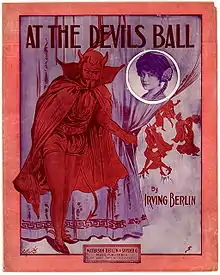Devil
In some religions and mythology, the Devil is an evil spirit, demon or supernatural being that tries to create problems for people and distance them from God. In some cultures, the Devil seen as the embodiment of evil. He is characterised by his red skin, horns and tail.
.jpg.webp)
Some people also use the word "Satan" for the most powerful devil.
Etymology
The word "devil" comes from the Greek word "diabolos" which means "someone who tells lies to hurt you". ("Diabolos" is translated to the English word "slanderer.") The New Testament uses "diabolos" as a title for Satan, so "the Devil" became another name for Satan in English.
In the Old Testament, there is the Serpent and the Satan, who may be two different characters. "Satan" in Hebrew means "adversary", which is a word for an enemy or opponent. Shaitan is also a word used for the Devil in the Koran, who often appears as an animal and tries to get people to do the wrong thing.[1]
Appearances in religions
Christianity
According to Christianity, the Devil wanted to be a deity besides God and be independent from God. Therefore, a war in heaven started and the angels battled. After the Devil lose the battle and was thrown out of heaven, he started doing bad things on the earth. He wants people to worship him instead of God. Sometimes he tries to trick people by giving them false promises.[2]
The other angels who were thrown out of heaven became evil spirits called demons. They obey the Devil and help him do evil things.
The Book of Revelation says that God will punish the Devil and his demons by throwing them into a Lake of Fire that burns in Hell. This will happen in the future.
Some Christians understand the Devil as the embodiment of chaos and death. They think that the Devil is the farthest someone can get away from God. God, as the opposite of the Devil, stands for life and the Devil for death. The closer someone gets to the Devil the closer people come to death and will not be resurrected.
Islam
In Islam, there is not only one devil, but there are several devils, who support Satan. The devils are invisible and tempt humans and djinns into sin. Humans and djinns, who follow the will of the devils, are called devils too.
Other cultures and religions
Not all religions believe in the Devil. For example, some forms of Buddhism do not believe in the Devil. Judaism, has Satan, but does not believe that Satan is the Devil, but only an angel.
In Wicca, the concept of the Devil and demons is also rejected, simply because, in Wiccan tradition, the creative energy is neither positive nor negative. According to Wiccans: "We are the ones who use this energy for good or evil. Therefore, the consequence of this action is our entire responsibility, not of an evil supernatural being." The corniferous god Cernunnos of Wicca was confused with the Christian Devil, for having horns (in antiquity, given the horns were phallic, they were associated with virility (fertility)), and were soon symbols of ancient European religions. He was already worshipped by pagan religions before Christianity arrived in Europe and the British Isles. Many satanists believe in the Devil or Satan only as a metaphor, not an actual being or person. In the Bahá'í Faith, the Devil as a malevolent, supernatural entity is not believed to exist. These terms do, however, appear in the Bahá'í writings, where they are instead used as metaphors for the lower nature of man.
Arts
Artists draw pictures of the Devil that show him as ugly and evil. But nobody knows what he may look like in fact. Usually he is a spirit that nobody can see, but he can make himself look like a real person in order to trick people. Many modern depictions of the Devil portray him as a red human-like being with horns and a pointed tail, carrying a red pitchfork or trident.
References
- "shaitan". The Free Dictionary. Retrieved 27 December 2009.
- "The Devil". Gospel Mysteries. Retrieved 17 February 2010.
